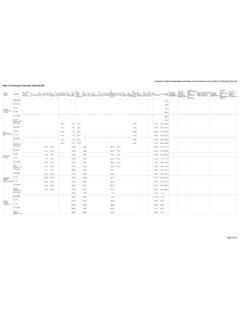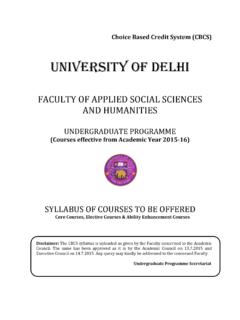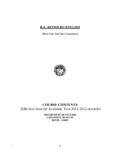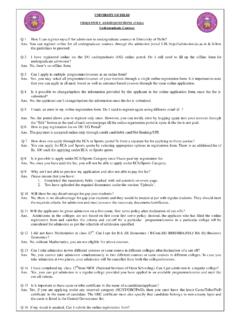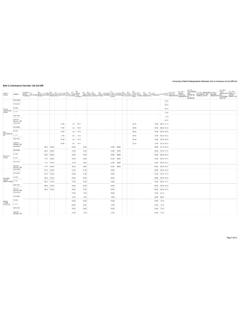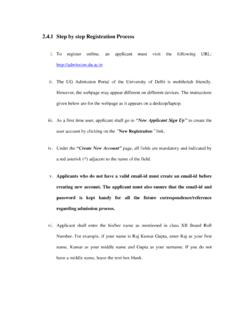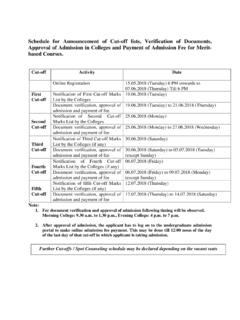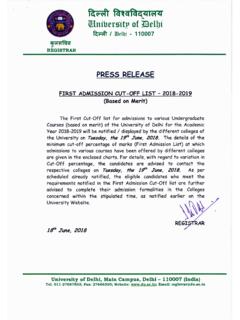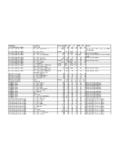Transcription of UNIVERSITY OF DELHI
1 UNIVERSITY OF DELHI . Bachelor of Arts (Honours) Economics (Effective from Academic Year 2019-20). Revised Syllabus as approved by Academic Council Date: No: Executive Council Date: No: CONTENTS. Preamble 1. Course Structure Alignment with CBCS ..1. Types of Courses ..1. Number of Courses and Credits ..2. Semester-wise Courses ..3. 2. Learning Outcome-based Approach ..5. 3. Graduate Attributes ..5. 4. Qualification Description ..5. 5. Programme Objectives ..5. 6. Programme Learning Outcomes ..6. 7. Teaching Learning Process ..6. 8. Assessment Methods / Evaluation Scheme ..6. Core Courses mathematical Methods for Economics I (HC11) ..8. Introductory Microeconomics (HC12) ..9. mathematical Methods for Economics II (HC21) ..11. Introductory Macroeconomics (HC22) ..12. Intermediate Microeconomics I (HC31) ..13. Intermediate Macroeconomics I (HC32).
2 14. Statistical Methods for Economics (HC33) ..15. Intermediate Microeconomics II (HC41) ..17. Intermediate Macroeconomics II (HC42) ..18. Introductory Econometrics (HC43) ..19. Indian Economy I (HC51) ..20. Development Economics I (HC52) ..21. Indian Economy II (HC61) ..23. Development Economics II (HC62) ..25. Discipline Specific Elective Courses Game Theory (HE51) ..27. International Trade (HE52) ..28. Public Economics (HE53) ..29. Financial Economics (HE54) ..30. Applied Econometrics (HE55) ..32. Economic History of India 1857-1947 (HE56) ..33. Political Economy I (HE57) ..35. Economics of Health and Education (HE62) ..37. Environmental Economics (HE63) ..38. Open Economy Macroeconomics (HE64)..39. Money and Financial Markets (HE65) ..41. Comparative Economic Development: 1850-1950 (HE66) ..42. Law and Economics (HE67) ..44. Political Economy II (HE68).
3 45. Generic Elective Courses Introductory Microeconomics (GE11) ..48. Introductory Macroeconomics (GE21) ..49. Data Analysis (GE31)..50. Money and Banking (GE32) ..51. Indian Economy I (GE33) ..52. Economic History of India (GE34) ..54. Public Finance (GE41) ..55. Indian Economy II (GE42) ..57. Global Political Economy (GE43)..58. Game Theory (GE44) ..60. Skill Enhancement Elective Courses Data Analysis (HS31) ..62. Research Methodology (HS41) ..63. Contemporary Economic Issues (HS42) ..64. Preamble The endeavour of any UNIVERSITY programme is to prepare its students to be upright and productive citizens. Accordingly, the UNIVERSITY of DELHI is moulding its undergraduate programmes to a Learning Outcome-based Curriculum Framework (LOCF). The LOCF approach is envisioned to provide a focussed, outcome-based syllabus at the undergraduate level with an agenda to structure the teaching-learning experiences in a more student-centric manner.
4 The LOCF approach has been adopted to strengthen students' experiences as they engage themselves in the programme of their choice. The undergraduate Programmes will prepare the students for both, academia and employability. Each programme vividly elaborates its nature and promises the outcomes that are to be accomplished by studying the courses. The programmes also state the attributes that it aims to inculcate at the point of graduation. These attributes encompass values related to wellbeing, emotional stability, critical thinking, social justice and skills for employability. In short, each programme prepares students for sustainability and life- long learning. The new curriculum of (Hons) Economics offers a rigorous basis for much of the advanced thinking in the Economics discipline. It provides the student with a logical paradigm for conceptualising and interpreting the behaviour and interactions of households, firms, and government institutions.
5 The curriculum allows students to choose elective courses from a set of courses with contemporary relevance, thereby offering students the flexibility to prepare for careers in academia, law, management, journalism, government, and many other fields. The programme is consistent with global standards in the Economics discipline. It offers training that is comparable to that of an undergraduate student at the world's best universities. The UNIVERSITY of DELHI hopes that the LOCF approach of the (Hons) Economics programme will help students in making an informed decision regarding the goals that they wish to pursue in further education and life. 1. Course Structure Alignment with CBCS. The (Hons) Economics programme is aligned with Choice Based Credit System (CBCS) adopted by the UNIVERSITY of DELHI . Types of Courses The following types of courses are offered under CBCS: 1.
6 1. Core Courses (CC). A core course is a compulsory course. A student of Economics (Hons) has to take fourteen such Economics courses over six semesters. 2. Elective Courses (EC). An elective course is a course that is to be chosen from a specified set of courses. These courses are of two types. Discipline Specific Electives (DSE). These are elective courses that provide advanced undergraduate training in specialised areas of Economics. A set of seven, semester-specific, courses of this kind are offered in the fifth and sixth semesters of the Honours programme. In each of these semesters, a student has to take two such courses from the relevant semester's set of seven courses. Generic Electives (GE). These courses, in disciplines other than Economics, are intended to broaden the training of a student in the Economics (Hons) programme. A student of Economics will take one such course, offered by another department, in each of Semesters I to IV.
7 3. Ability Enhancement Compulsory Course (AECC). Two such courses are to be taken, one in Semester I (Art of Communication, equivalent to MIL) and one in Semester II (Environmental Science). 4. Skill Enhancement Course (SEC). A student is to take one such course in Semester III and one in Semester IV. Number of Courses and Credits 1. Core Courses (CC): 14 (6 credits each). 2. Discipline Specific Electives (DSE): 4 (6 credits each). 3. Generic Electives (GE): 4 (6 credits each). 4. Skill Enhancement Courses (SEC): 2 (4 credits each). 5. Ability Enhancement Compulsory Courses (AECC): 2 (4 credits each). Total number of courses (credits) taken by a student: 26 (148). Table 1. Semester-wise Distribution of Credits Year Semester Courses Credits First I 2 CC (x6) 22. 1 AECC (x4). 1 GE (x6). II 2 CC (x6) 22. 1 AECC (x4). 1 GE (x6). Second III 3 CC (x6) 28.
8 1 SEC (x4). 2. 1 GE (x6). IV 3 CC (x6) 28. 1 SEC (x4). 1 GE (x6). Third V 2 CC (x6) 24. 2 DSE (x6). VI 2 CC (x6) 24. 2 DSE (x6). Total 26 148. Semester-wise Courses Table 2. Courses for (Hons) Economics Semester Course title Course code CC AECC SEC DSE GE. mathematical HC11. I Methods for Art of GE. Economics I Communi- 1. Introductory HC12 cation Micro -economics mathematical HC21. II Methods for Environ- Economics II mental GE. Introductory HC22 Science 2. Macro- economics Intermediate HC31. III Micro- GE. economics I 3. Intermediate HC32. Macro- economics I. Statistical HC33. Methods for Economics HS31 Data Analysis IV Intermediate HC41. Micro- economics II. 3. Intermediate HC42 GE. Macro- 4. economics II. Introductory HC43. Econometrics Pick one from HS41 Research Method- ology HS42 Contem- porary Economic Issues Indian HC51. V Economy I.
9 Development HC52. Economics I. Pick two from HE51 Game Theory HE52 International Trade HE53 Public Economics HE54 Financial Economics HE55 Applied Econometrics HE56 Economic History of India (1857-1947). HE57 Political Economy I. Indian HC61. VI Economy II. Development HC62. Economics II. Pick two from HE62 Economics of Health and Education HE63 Environmental Economics HE64 Open Economy Macroeconomics HE65 Money and Financial Markets HE66 Comparative Economic Development (1850- 1950). 4. HE67 Law and Economics HE68 Political Economy II. Key: CC = Core Course; AECC = Ability Enhancement Compulsory Course; SEC =. Skill Enhancement Course; DSE = Discipline Specific Elective; GE = Generic Elective 2. Learning Outcome-based Approach The (Hons) Economics programme provides a firm basis for much of the advanced thinking in the Economics discipline.
10 It provides the student with a logical paradigm for modelling and interpreting the behaviour and interactions of households, firms, and government institutions. The programme is consistent with global standards in the Economics discipline. It offers training that is comparable to that of an undergraduate student at the world's best universities. The curriculum allows students to choose elective courses from a set of courses with contemporary relevance, thereby offering students the flexibility to prepare for careers in academia, law, management, journalism, government, and many other fields. 3. Graduate Attributes Upon completion of this programme, a student will have the necessary skills to understand and analyse in a logical manner all major economic phenomena. A student will be able to analyse government policies and regulations, and demonstrate their significance.
